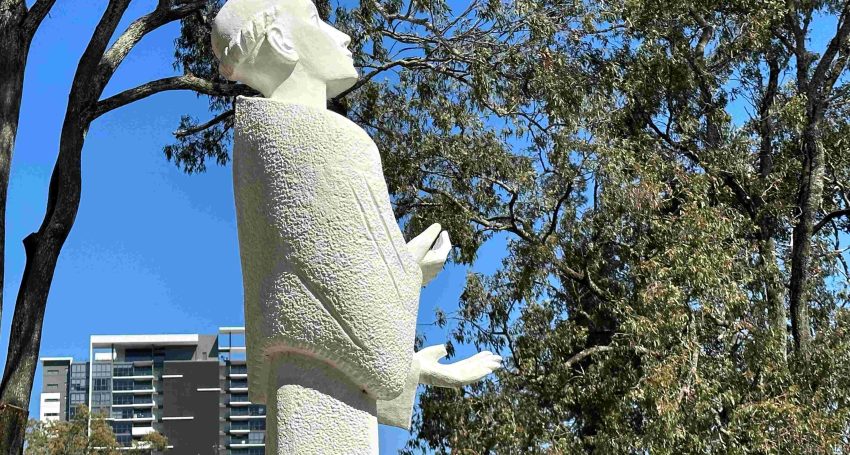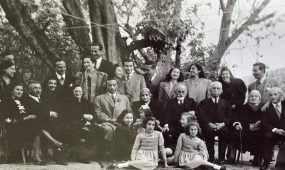Who was St Francis of Assisi?
People & History
“Although poverty was Francis’ cornerstone, he was also passionate about recognising the sanctity of all God’s creatures. He was often seen in conversation with animals of all kinds, and in his famous ‘Canticle of the Creatures’ his habit of calling elements of nature ‘brother and sister’ is clearly documented,” says The Rev’d Dr Gemma Dashwood OAM TSSF

In my mid-20s I was heavily involved with my local church, but I found myself seeking a broader perspective on theology and spirituality than what I was experiencing in the parish setting. Around the same, by some divine intervention, my mum gave me a brochure on becoming a Tertiary Franciscan — and the more I read, the more I was certain that St Francis of Assisi offered the depth of spirituality I was looking for.
St Francis was born Francesco di Pietro di Bernardone in Assisi in 1181 into a wealthy family. In his early years he lived a carefree life, wanting for nothing. After fighting in a local war against Perugia in 1202 he was held captive for a year, and his health suffered greatly. Despite this he was keen to rejoin the army, but on his way to enlist it is said that he received a vision instructing him to return home. Soon after, while praying in the church of San Damiano a voice emanated from the crucifix: “Go, Francis, and repair my house.” While initially Francis took this literally and worked hard to raise funds to repair the run-down church, it became clear that the task was somehow broader than his initial thoughts. Francis realised he needed to reject his family wealth and take on the life of a poor man, and dedicate his life to following Jesus and teaching those he met.
Despite his lay status, Francis felt called to form an Order, and he devised a simple Rule, which was subsequently approved by Pope Innocent III. The men who followed Francis were known as members of the “Lesser Brothers” of the new Franciscan Order, and they preached on the street, eschewed personal possessions and lived together in community in the Porziuncola in Assisi.
Three years later, Francis established a second order, for women that was led by Francis’ loyal friend and supporter, Clare (hence they were known as the “Poor Clares”). They lived in community within the grounds of the San Damiano church.
Advertisement
Almost a decade later, the Third Order was formed — which was open to both men and women, married or single, lay or ordained — who wanted to follow Jesus through the principles of St Francis, but were unable to leave their families. It is this Order that I was drawn to almost 20 years ago.
Although poverty was Francis’ cornerstone, he was also passionate about recognising the sanctity of all God’s creatures. He was often seen in conversation with animals of all kinds, and in his famous “Canticle of the Creatures” his habit of calling elements of nature “brother and sister” is clearly documented:
“Praised be You, my Lord, through our Sister Mother Earth, who sustains and governs us, and who produces various fruit with coloured flowers and herbs.”
His influence in the love and appreciation of nature, including all animals, is felt to this day, as we continue to celebrate the Season of Creation in the weeks leading up to the Feast Day of St Francis on 4 October, which is when many churches offer blessings for animals within a special liturgy.
Advertisement
Franciscans live by three aims, three ways of service and three notes of the Order. Despite the fact that they were created around 900 years ago, they still have significant relevance to the modern day.
The first aim is “to make our Lord known and loved everywhere” — the true meaning of which St Francis illustrated by saying “Go and preach the gospel, and if necessary, use words”. By being kind and loving and by fulfilling the second aim “to spread the spirit of love and harmony”, Francis knew that there was no better way of walking the path of Jesus.
The third aim of Franciscans is “to live simply”. Although the First and Second Orders must live in absolute poverty, Third Order Franciscans (“Tertiaries”) are allowed to own property and earn money, but they must consider how they use wealth and refrain from accumulating unnecessary material things.
The Three Ways of service that Franciscans vow to keep are “prayer, study and work”. While Biblical studies and regular church attendance are assumed, Franciscans are encouraged to study whatever topic it is that they are drawn to. In the “Rule of Life”, which is written by each Franciscan before they are professed (received into the Order by taking lifelong vows), they must commit to fulfilling each one of these Ways.
The Three Notes of the Orders of St Francis are humility, love and joy. St Francis was known for his profound humility — his simple brown tunic (which he had repaired so many times it is said that no original piece of fabric remained), his lack of material possessions and his dedication to people who were sick and homeless.
Franciscan love is one that is able to bridge any gap. In 1219 Francis travelled to Egypt and sought an audience with the sultan al-Kamil. It is recorded that the sultan was impressed by Francis’ message to the extent that he allowed him to visit the sacred places in the Holy Land.
Of all the requirements of the followers of Francis, I find that sometimes the hardest one is “joy”. There is so much happening in the world at this time where no joy can be found. Despite the war, famine and social injustice that is rife around the world, it is a stolen moment where a glimpse of a flower in bloom or the love and trust of an animal who can sense your despair, that can be a reminder of the joy that Francis urges us to seek out.
It took only two years after the death of Francis — who lived until his mid-40s — for Pope Gregory IX to canonise the man of poverty and peace who loved and protected all creation. Like many thousands of others, my life continues to be enriched by St Francis of Assisi and all we can learn from him.
Editor’s note: Everyone is invited to join in the St Francis Festival, a free fun community event at St Francis College (233 Milton Rd, Milton) on 14 October 2023 between 10am and 3pm. The event will include workshops, food, stalls, kids’ activities, music and pet blessings. Find out more by visiting the St Francis College website.





